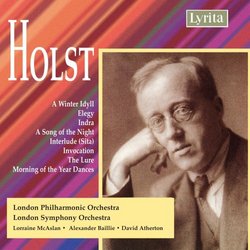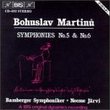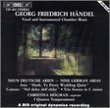Unkown Holst exposed
Larry VanDeSande | Mason, Michigan United States | 04/15/2008
(4 out of 5 stars)
"Anyone that knows Gustav Holst (1874-1934) beyond "The Planets", the two suites for band, St. Paul's and Brook Green suites and maybe the Fugal Concerto probably thinks they have a pretty good handle on the composer. I thought so, too, until I heard this collection of early and late miniatures from him.
Unlike another Holst early venture -- "The Mystic Trumpeter" -- that I was exposed to last year via a Naxos recording of "The Planets", this CD consists of music I'd never before heard nor heard of. Much of it is early Holst composed in a style few will recognize and the rest is typical of the composer's majestically projected and brass-dominant revelry.
The initial item, "A Winter Idyll", sounds like an overture when it begins, then takes on the tenor of tone poem, but seems too short and compact for such a composition. It's followed by an "Elegy" for William Morris that is also known as "The Cotswolds" symphony. If you can imagine the early Holst writing a nine-minute symphony, you might think it could be something like this. "Indra" a symphonic poem on Eastern themes, is more akin to what we think we know of Holst and reflects the composer's abiding interest in Hinduism.
The remaining compositions help us round out our appreciation of Holst and confirms the demarcation from his cohorts of the English pastoral school. While Holst was a peer and great friend to Ralph Vaugahn Williams, his music is definitely not of that vintage. While RVW and the English pastoralists typically comoposed on the basis of English folk song, Holst -- who also adored folk music -- often found his inspiration elsehwere. A far more extrovert orchestrator, the music on this CD reveals a footprint from "The Planets" in nearly every one of its various showy and introverted sections that break him away from English peers in terms of metrics and inspiration.
Anyone that wants to trace Holst backward from his great fame would learn a thing or two about him they didn't know by acquiring this recording. Like other Lyrita releases, it was recorded during the 1970s and the sound exceeds most original digital recordigs released today with aromatic, deep and truthful sound, elegant playing by the London Philharmonic and direction by David Atherton. Its production values are first rate and, while not every piece is equally memorable or significant, the issue makes a fine concert of unknown Holst."
Appealing Lesser Works by a Major Composer
M. C. Passarella | Lawrenceville, GA | 01/25/2008
(5 out of 5 stars)
"I have always classed Holst as a major composer, and not merely based on the wild success of You Know What. In fact, as a composer seeking a place in musical history, Holst had two main problems, both of them named "The Planets."
First, this work is so widely known and frequently played and recorded that it has almost cast Holst into the Outer Darkness inhabited by one-work wonders such as Ruggiero Leoncavallo. (A more apt comparison is Max Bruch, whose First Violin Concerto eclipsed other, equally fine compositions.)
Second, "The Planets," though perhaps not Holst's finest piece or even his most characteristic, is the big work in his canon. Despite the fact that Holst composed other large-scale pieces, they were nowhere near as successful as "The Planets," attractive as, say, "The Choral Symphony" is, not to mention his operas.
But of course, there are other masterworks among his compositions: "The Saint Paul Suite," the two suites for band, "The Hymn of Jesus," the ballet music from "The Perfect Fool," "A Fugal Overture"--all are first-rate and, at least in Europe, firmly a part of the repertoire. Too bad I have yet to hear any of these works live in America. And I've been attending concerts for years and years.
But anyway, my role here is not to argue for the rehabilitation of Holst's standing among modern composers; I want to talk about the contents of the present disc, all attractive, all highly accessible and memorable.
Holst is often mentioned together with Ralph Vaughan Williams, his lifelong friend and fellow student. But early on, Holst much more successfully embraced modernism and brought elements of its language into his essentially late-Romantic musical rhetoric. That he made modernist gestures his own is clear from the highly individual style of his best works. That style is greatly in evidence in the latest composition on the disc, the "Dances from the Morning of the Year." Reminiscent of the fiery ballet music from "The Perfect Fool," it has all the earmarks of late Holst--striking use of percussion, motoric rhythms and melodies at the service of those rhythms.
Then there is the music from the opera "Sita" and the tone poem "Indra." Both works enshrine Holst's abiding interest in the culture and thought of India. Both are little gems of orchestral color, with ravishing melodies.
Even the earliest pieces, the tone poem "A Winter Idyll" (1897) and the best-regarded movement from "The Cotswolds Symphony" (1900), suggest that Holst had places to go in the musical world. "A Winter Idyll" seems to look forward to the nature-based tone poems by Englishman Arnold Bax, but I like it better than most of Bax; there's more muscle and verve in Holst, I think.
The performances by David Atherton, a Holst specialist, are everything they should be, and the sound, while a little over-bright in the manner of early digital recordings (though two works are ADD), is otherwise natural and wonderfully detailed. A top-notch disc in every way.
"


 Track Listings (8) - Disc #1
Track Listings (8) - Disc #1

